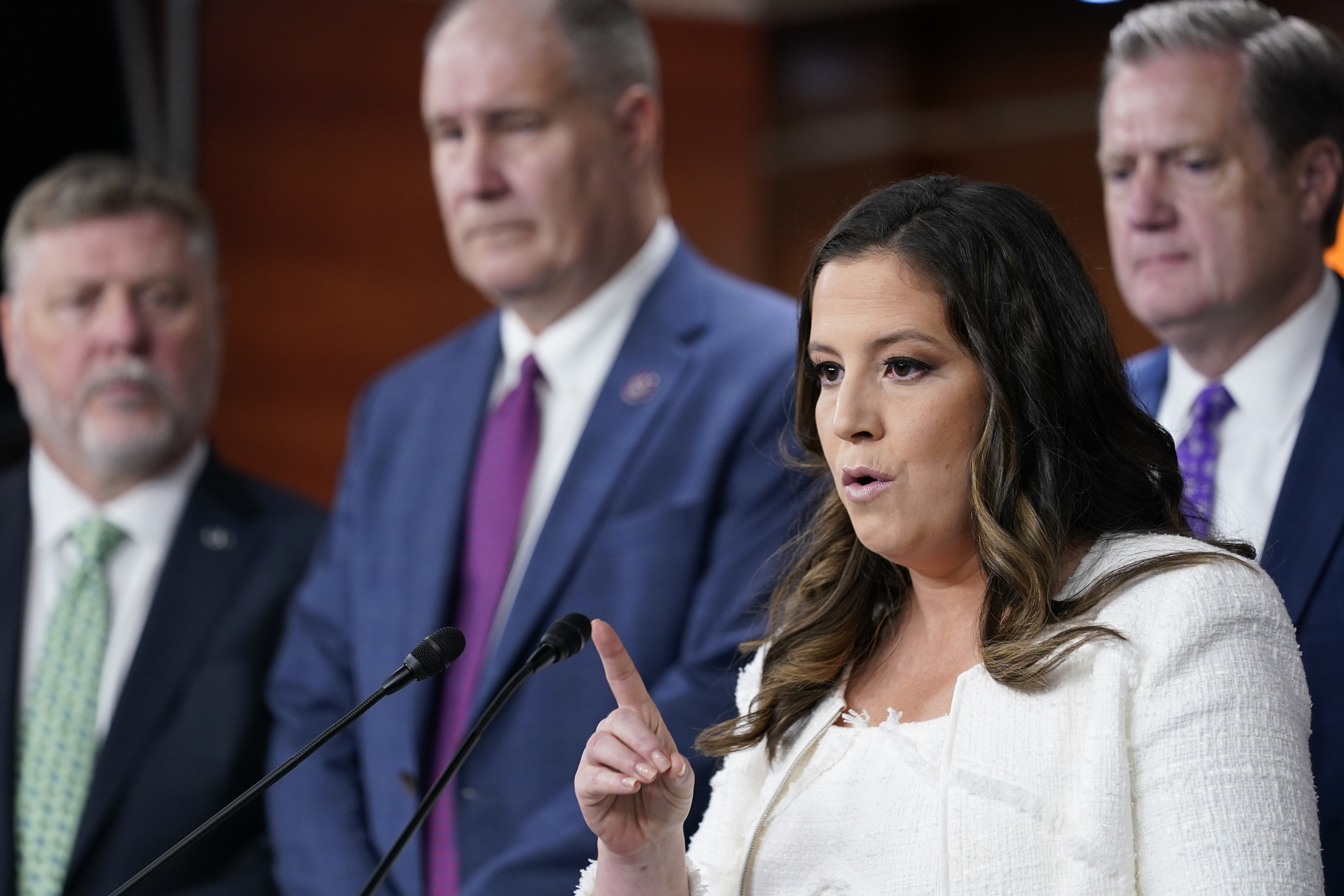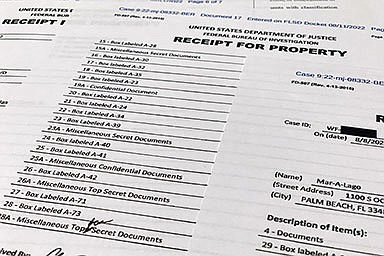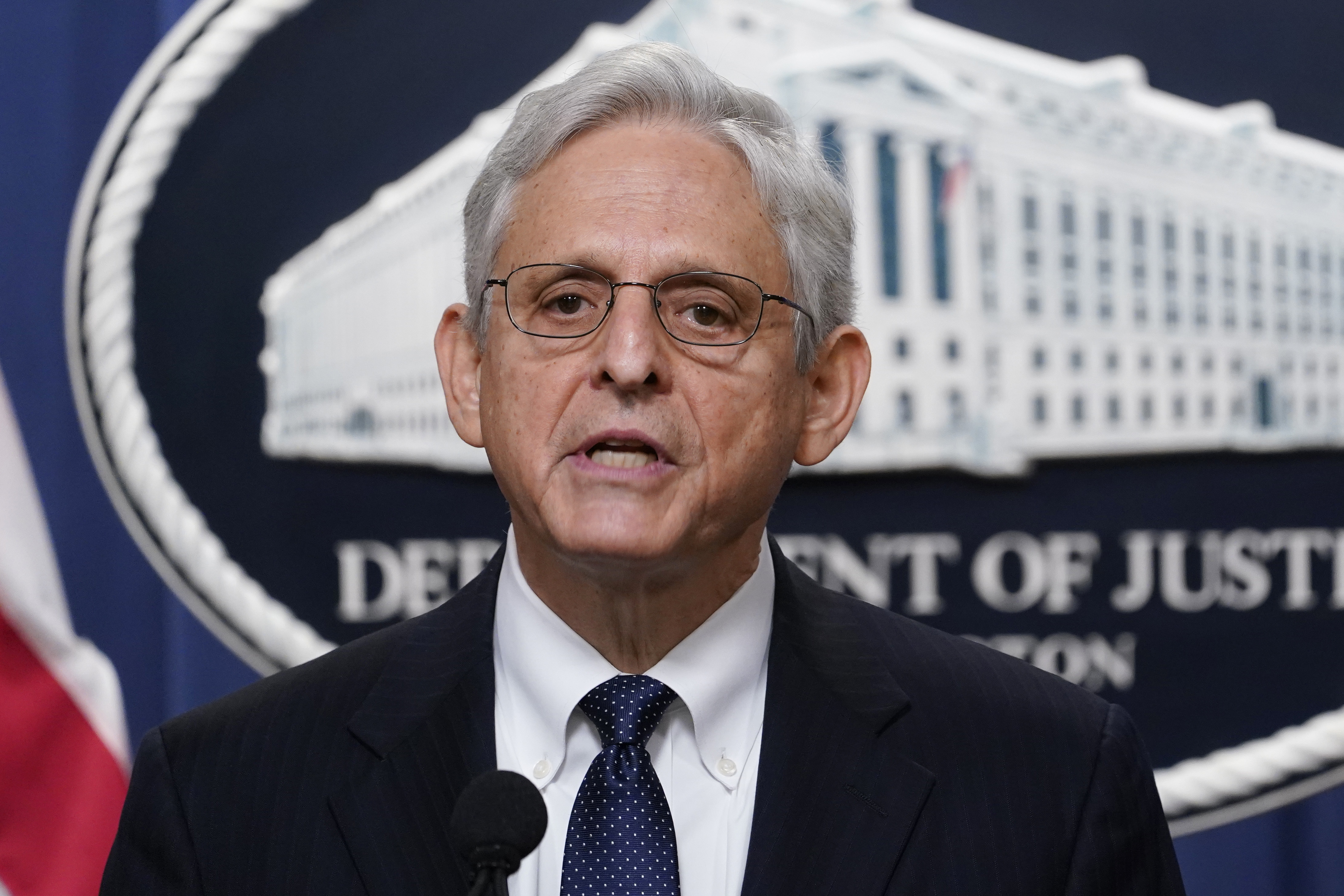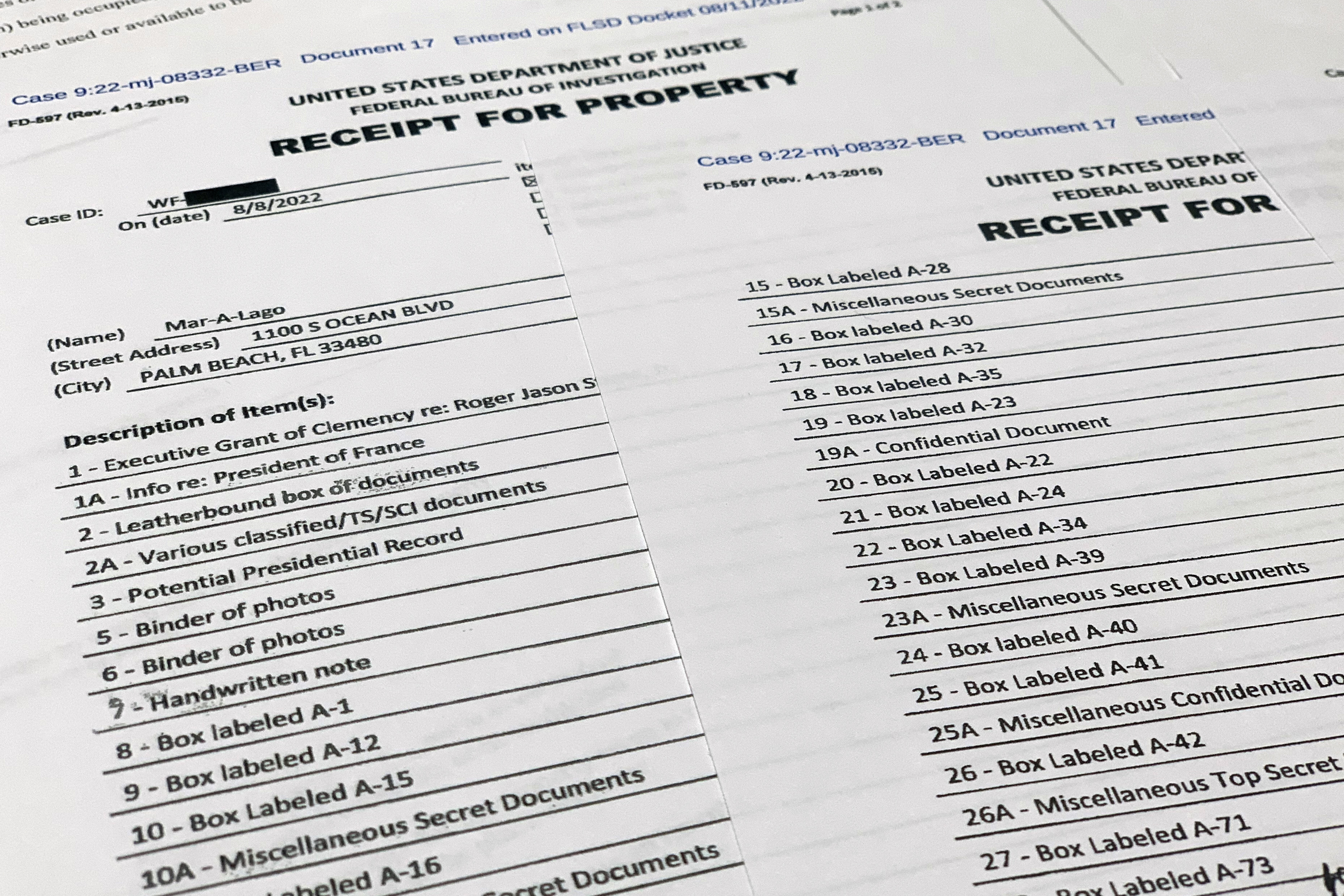WASHINGTON -- The FBI recovered "top secret" and even more sensitive documents from former President Donald Trump's Mar-a-Lago estate in Florida, according to court papers released Friday after a federal judge unsealed the warrant that authorized the search this week.
A property receipt unsealed by the court shows FBI agents took 11 sets of classified records from the estate during a search Monday.
The seized records include some marked not only top secret but also "sensitive compartmented information," a special category meant to protect the nation's most important secrets that if revealed publicly could cause "exceptionally grave" damage to U.S. interests. The court records did not provide specific details about information the documents might contain.
The warrant says federal agents were investigating potential violations of three different federal laws, including one that governs gathering, transmitting or losing defense information under the Espionage Act. The other statutes address the concealment, mutilation or removal of records and the destruction, alteration or falsification of records in federal investigations.
The property receipt also shows federal agents collected other potential presidential records, including the order pardoning Trump ally Roger Stone, a "leatherbound box of documents" and information about the "President of France." A binder of photos, a handwritten note, "miscellaneous secret documents" and "miscellaneous confidential documents" were also seized in the search.
Trump's attorney, Christina Bobb, who was present at Mar-a-Lago when the agents conducted the search, signed two property receipts -- one that was two pages long and another that is a single page.
In a statement earlier Friday, Trump claimed that the documents seized by agents were "all declassified," and argued that he would have turned them over if the Justice Department had asked.
While incumbent presidents generally have the power to declassify information, that authority lapses as soon as they leave office and it was not clear whether the documents in question have been declassified. And even an incumbent's powers to declassify may be limited regarding secrets dealing with nuclear weapons programs, covert operations and operatives and some data shared with allies.
Trump kept possession of the documents despite multiple requests from agencies, including the National Archives, to turn over presidential records in accordance with federal law.
The Mar-a-Lago search warrant served Monday was part of an ongoing Justice Department investigation into the discovery of classified White House records recovered from Trump's home earlier this year. The Archives had asked the department to investigate after saying 15 boxes of records it retrieved from the estate included classified records.
It remains unclear whether the Justice Department moved forward with the warrant simply as a means to retrieve the records or as part of a wider criminal investigation or attempt to prosecute the former president. Multiple federal laws govern the handling of classified information, with both criminal and civil penalties, as well as presidential records.
U.S. Magistrate Judge Bruce Reinhart, the same judge who signed off on the search warrant, unsealed the warrant and property receipt Friday at the request of the Justice Department after Attorney General Merrick Garland declared there was "substantial public interest in this matter," and Trump said he backed the warrant's "immediate" release. The Justice Department told the judge Friday afternoon that Trump's lawyers did not object to the proposal to make it public.
The Justice Department's request was striking because such warrants traditionally remain sealed during a pending investigation. But the department appeared to recognize that its silence since the search had created a vacuum for attacks by Trump and his allies, and felt that the public was entitled to the FBI's side about what prompted Monday's action at the former president's home.
The information was released as Trump is possibly preparing for another run for the White House. During his 2016 campaign, he pointed frequently to an FBI investigation into his Democratic opponent, Hillary Clinton, over whether she mishandled classified information.
To obtain a search warrant, federal authorities must prove to a judge that probable cause exists to believe that a crime was committed. Garland said he personally approved the warrant, a decision he said the department did not take lightly given that standard practice where possible is to select less intrusive tactics than a search of one's home.
In this case, according to a person familiar with the matter, there was substantial engagement with Trump and his representatives before the search warrant, including a subpoena for records and a visit to Mar-a-Lago a couple of months ago by FBI and Justice Department officials to assess how the documents were stored. The person was not authorized to discuss the matter by name and spoke on condition of anonymity.
FBI and Justice Department policy cautions against discussing ongoing investigations, both to protect the integrity of the inquiries and to avoid unfairly maligning someone who is being scrutinized but winds up ultimately not being charged. That's especially true in the case of search warrants, where supporting court papers are routinely kept secret as the investigation proceeds.
In this case, though, Garland cited the fact that Trump himself had provided the first public confirmation of the FBI search, "as is his right." The Justice Department, in its new filing, also said that disclosing information about it now would not harm the court's functions.
The Justice Department under Garland has been leery of public statements about politically charged investigations, or of confirming to what extent it might be investigating Trump as part of a broader probe into the Jan. 6 riot at the U.S. Capitol and efforts to overturn the results of the 2020 election.
The department has tried to avoid being seen as injecting itself into presidential politics, as happened in 2016 when then-FBI Director James Comey made an unusual public statement announcing that the FBI would not be recommending criminal charges against Clinton regarding her handling of email -- and when he spoke up again just over a week before the election to notify Congress that the probe was being effectively reopened because of the discovery of new emails.
The White House, also, has made a point of staying quiet.
WHITE HOUSE MUM
President Joe Biden was not given advance notice of Monday's search, White House press secretary Karine Jean-Pierre said this week. And a White House official said Biden was not given a heads-up that Garland would speak to reporters Thursday, when he announced that the Justice Department was moving to unseal the search warrant.
The White House's approach is part of a concerted effort to make sure the law enforcement operation is not seen as partisan.
Biden promised during his presidential campaign to restore the independence of the Justice Department, which Trump critics said had been weaponized for political gain. Biden's team is also aware that opining on the FBI search would most likely fuel accusations by Trump's allies that the president was using the Justice Department to weaken a probable opponent in the 2024 presidential election.
"President Biden has been very clear from before he was elected president and throughout his time in office that the Justice Department conducts its investigations independently," Jean-Pierre said this week. "He believes in the rule of law."
Still, top Republicans and prominent conservatives have tried to assail federal law enforcement officials as biased against the former president. A number of House Republicans, including Rep. Kevin McCarthy of California, the minority leader, raced to portray the search as politically motivated. Trump has also said the search is a part of a "witch hunt."
But in recent days, Republicans in the Senate, including Sen. Mitch McConnell of Kentucky, the minority leader, have softened their tone while still pressing for more information about the evidence that led authorities to seek a warrant.
Information for this article was contributed by Michael Balsamo, Zeke Miller, Eric Tucker, Lindsay Whitehurst and Meg Kinnard of The Associated Press; and by Zolan Kanno-Youngs of The New York Times.
 Rep. Elise Stefanik, R-N.Y., speaks during a news conference on Capitol Hill in Washington, Friday, Aug. 12, 2022, on the FBI serving a search warrant at former President Donald Trump's home in Florida. She is joined by, from left, Rep. Rick Crawford, R-Ark., Rep. Trent Kelly, R-Miss., and House Intelligence Committee ranking member Rep Mike Turner, R-Ohio. (AP Photo/Susan Walsh)
Rep. Elise Stefanik, R-N.Y., speaks during a news conference on Capitol Hill in Washington, Friday, Aug. 12, 2022, on the FBI serving a search warrant at former President Donald Trump's home in Florida. She is joined by, from left, Rep. Rick Crawford, R-Ark., Rep. Trent Kelly, R-Miss., and House Intelligence Committee ranking member Rep Mike Turner, R-Ohio. (AP Photo/Susan Walsh) FBI Director Christopher Wray speaks to journalists at the Omaha FBI office on Wednesday, Aug.10, 2022, in Omaha, Neb. Wray addressed threats made to law enforcement after agents raided former President Donald Trump’s Mar-a-Lago residence, in Palm Beach, Fla. (Chris Machian/Omaha World-Herald via AP)
FBI Director Christopher Wray speaks to journalists at the Omaha FBI office on Wednesday, Aug.10, 2022, in Omaha, Neb. Wray addressed threats made to law enforcement after agents raided former President Donald Trump’s Mar-a-Lago residence, in Palm Beach, Fla. (Chris Machian/Omaha World-Herald via AP)



